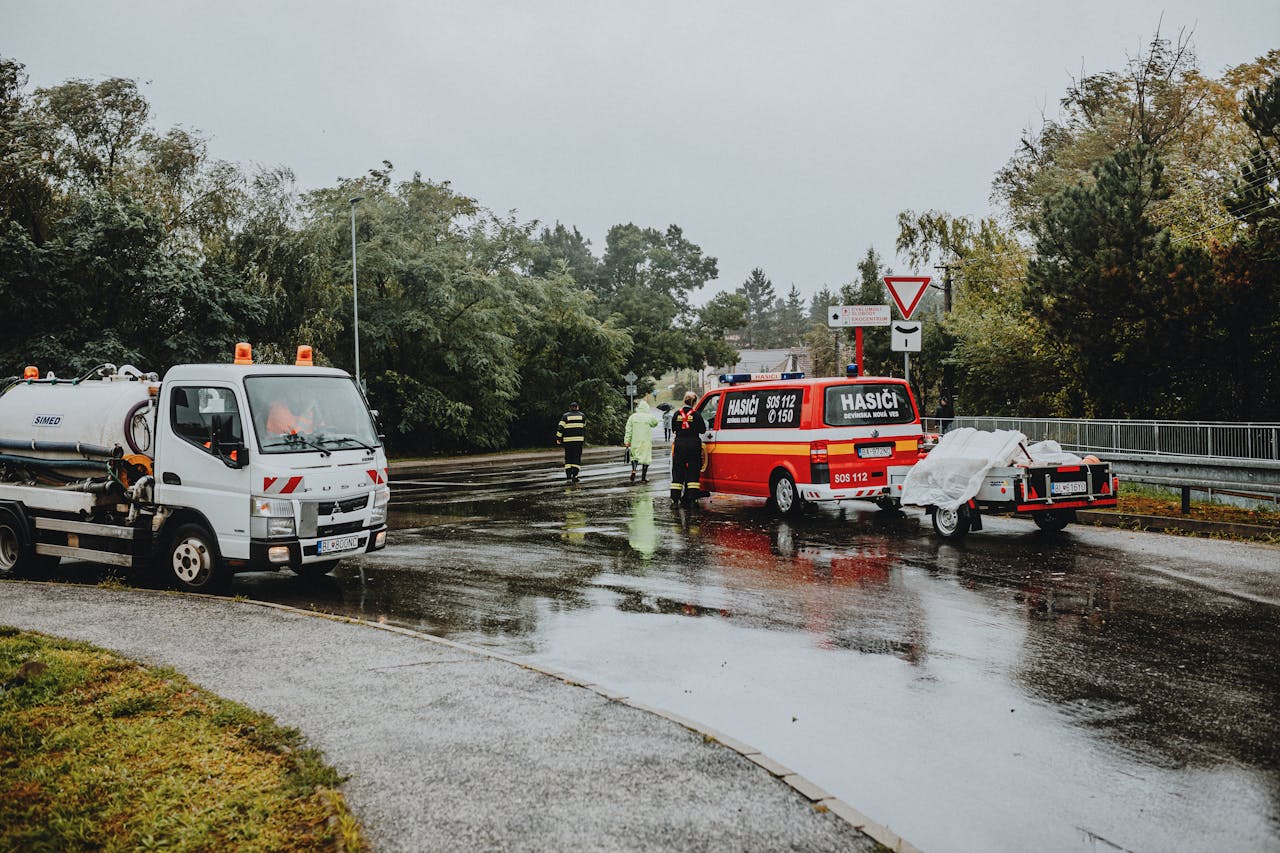Truck accidents are among the most dangerous types of collisions on the road, often resulting in serious injuries or fatalities due to the sheer size and weight of the vehicles involved. While human error, vehicle maintenance issues, and traffic laws are commonly cited causes of truck accidents, one often overlooked factor is weather conditions. In Orange County, with its varying weather patterns ranging from sunny days to foggy mornings and rare but impactful rainstorms, weather plays a significant role in truck accident risk.
In this blog, we’ll explore how different weather conditions can contribute to truck accidents in Orange County, the challenges drivers face during adverse weather, and how you can protect yourself on the road. We will also discuss the legal implications of weather-related accidents in truck injury claims and how a skilled truck accident lawyer can help you navigate such cases.
1. How Weather Affects Truck Drivers
Truck drivers face unique challenges compared to passenger vehicle drivers, and weather conditions only amplify those challenges. Due to the size and weight of commercial trucks, they are significantly affected by weather in ways that smaller vehicles are not.
a) Rain and Wet Roads
Heavy rain is a common weather condition that can make roads slippery, reducing tire traction and increasing the likelihood of trucks losing control. When roads are wet, it becomes harder for a truck to stop quickly, and stopping distances increase. Large trucks also tend to hydroplane more easily on wet surfaces, especially if their tires are not properly maintained.
For truck drivers, wet roads can cause:
-
Increased stopping distance: Trucks take much longer to stop on wet roads than smaller vehicles, which can lead to rear-end collisions if drivers don’t account for the road conditions.
-
Skidding and loss of control: Trucks, especially those carrying heavy loads, are more prone to skidding in the rain, increasing the risk of accidents, especially on highways or curves.
-
Brake failure: Excessive water buildup in the brake system can cause brake failure, particularly in trucks that haven’t been properly maintained.
In Orange County, sudden rain showers, especially during the winter months, can catch drivers off guard, increasing the risk of accidents.
b) Foggy Conditions
Orange County, especially near coastal areas, is prone to dense fog in the early morning and late evening hours. When fog rolls in, visibility is reduced, making it challenging for truck drivers to see other vehicles, road signs, or obstacles on the road. For large trucks, this lack of visibility is particularly hazardous.
When driving in foggy conditions, truck drivers face:
-
Reduced stopping time: In thick fog, truck drivers may not see stopped traffic or obstacles in time to avoid a crash, leading to rear-end collisions or pile-ups.
-
Difficulty in judging distance: It becomes harder for drivers to judge distances between vehicles, making it easier for accidents to occur when trucks follow too closely or make sudden lane changes.
-
Increased risk of fatigue: In addition to visibility issues, foggy conditions can be mentally taxing, leading to driver fatigue, which is another major risk factor in truck accidents.
c) Wind
Orange County’s coastal location means that gusty winds are common, especially in areas near the beach and along the coast. Strong winds can be dangerous for truck drivers, particularly those driving large or empty trailers. Crosswinds can cause trucks to sway or tip over, especially if the driver is not prepared.
Truck drivers may experience:
-
Loss of control: Crosswinds can push trucks off course, making it harder for the driver to maintain a straight line, potentially causing them to veer into other lanes or off the road.
-
Tipping over: Trucks with high trailers or loads that are not evenly distributed are more susceptible to tipping over when wind speeds increase.
-
Difficulty navigating turns: High winds can also affect a driver’s ability to safely navigate curves and turns, particularly on highways or bridges that are more exposed to the wind.
In areas near the ocean or in open spaces, wind gusts can suddenly make driving difficult or dangerous, even for experienced truck drivers.
d) Hot Temperatures and Overheating
California’s hot summers, especially inland in Orange County, pose additional challenges for truck drivers. High temperatures can cause vehicles, including trucks, to overheat, which can result in mechanical failure, especially if the truck isn’t properly maintained.
Some risks associated with extreme heat include:
-
Engine failure: If a truck’s engine overheats due to poor maintenance or excessive heat, it may cause the truck to break down or stall on the highway, leading to accidents.
-
Tire blowouts: High temperatures can cause tires to expand, increasing the likelihood of blowouts, particularly if the tires are worn down or underinflated.
-
Driver fatigue: Extreme heat can cause driver fatigue and dehydration, reducing a truck driver’s reaction time and alertness, which is critical for safely operating large vehicles.
2. Legal Implications of Weather-Related Truck Accidents in Orange County
Weather-related truck accidents can complicate personal injury claims. Since weather is considered a “force majeure” (an act of nature), it may be used as a defense in some cases, where the truck driver or the trucking company may argue that the accident was caused by unforeseeable weather conditions beyond their control. However, in many cases, the accident may still be preventable, and the truck driver or trucking company could be held liable.
Some key legal points to keep in mind:
-
Negligence in Adjusting to Weather: Even when weather conditions are unfavorable, truck drivers have a legal duty to adjust their driving to match the conditions. This means reducing speed, increasing following distance, and taking extra precautions in fog, rain, or wind. Failure to do so may constitute negligence.
-
Trucking Company Responsibility: Trucking companies are required to properly maintain their vehicles, including checking tire pressure, brakes, and cooling systems, especially before long trips. If a truck’s mechanical failure due to weather conditions is a contributing factor in the accident, the company may be held liable.
-
Comparative Negligence: California follows a comparative negligence rule, meaning that if both the driver and the weather contributed to the accident, the fault will be apportioned based on the degree of responsibility of each party. If the truck driver was speeding during a rainstorm or failed to adjust to the conditions, they could still be partially or fully responsible for the accident.
3. How to Protect Yourself in Bad Weather
As a driver sharing the road with trucks, there are several precautions you can take to stay safe during adverse weather conditions:
-
Reduce your speed: Regardless of the weather, always drive at a safe and appropriate speed. Slowing down gives you more time to react to obstacles or changes in the road.
-
Increase your following distance: Give trucks and other vehicles more space, especially when it’s rainy or windy. Trucks need more time to stop, so keeping a safe distance is essential.
-
Be aware of truck blind spots: When visibility is low due to fog or rain, avoid driving in truck blind spots. Make sure you can see the truck driver’s mirrors before moving into their lane.
-
Check weather conditions: Stay updated on weather forecasts and road conditions, especially if you’re planning a long drive in areas prone to weather extremes.
4. How a Truck Accident Lawyer Can Help
If you’ve been injured in a truck accident caused by adverse weather conditions, having a skilled Orange County truck accident lawyer can make all the difference. A lawyer will help you:
-
Investigate the cause of the accident: An experienced attorney will investigate whether the truck driver or trucking company failed to take proper precautions to adjust to the weather conditions.
-
Obtain evidence: They will gather crucial evidence, such as weather reports, accident scene photos, and expert testimony, to help establish negligence.
-
Negotiate with insurance companies: Trucking companies and their insurers may try to downplay their liability. A lawyer will fight for fair compensation for your injuries, lost wages, and pain and suffering.
5. Conclusion
Weather conditions play a significant role in truck accidents in Orange County. From rain and fog to heat and wind, these factors can increase the risk of serious accidents, especially when truck drivers fail to adjust their driving to match the conditions. Whether the weather played a direct role in causing the accident or simply worsened the consequences, it’s essential to consult with a skilled truck accident lawyer who can help protect your rights and fight for the compensation you deserve. If you’ve been injured in a truck accident, don’t hesitate to reach out to an experienced attorney who can guide you through the legal process and ensure you get the justice you deserve.



